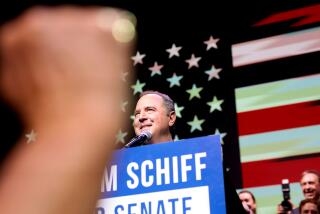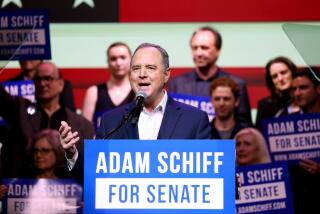Voters may be tired of Boxer, Feinstein, but it doesn’t mean they’d lose
Voters can be a lot like those acquisitive contestants on TV’s “Let’s Make A Deal.”
Do you take the cash or risk it for the surprise that beckons behind Door No. 1? The money is a sure thing. But how about a whirlwind vacation, that handsome dinette set, or the chance to drive off in a spanking new car?
It can be the same when it comes to choosing a candidate in the early stages of a campaign. There is the tried-and-true, the known commodity, the household name. But what if the choice was someone new and utterly different: a candidate who was honest and altruistic, principled and wise, unyielding in his or her beliefs yet somehow accommodating enough to break through the unceasing political paralysis and achieve great things?
Never mind that that sort of mythical individual exists mainly on celluloid. Who wouldn’t choose that candidate against the decidedly human lineup who currently hold office and conduct our public affairs?
A recent USC Dornsife/Los Angeles Times poll found that a majority of Californians surveyed are ready for the state’s two Democratic senators, Barbara Boxer and Dianne Feinstein, to come home and retire to these golden hills, a fact that is hardly surprising.
Both were first elected in 1992, back when the World Wide Web was in its infancy, Bill Clinton had a plume of dark hair and Hillary Rodham Clinton was his dutiful helpmate.
The argument for fresh blood is inevitable. So, too, is the partisan desire among Republicans to see the state’s left-leaning senators replaced. But close to half the Democrats also expressed a desire for Boxer and Feinstein to go, which would suggest a certain vulnerability.
Some of that may be liberal discontent; Feinstein, especially, has alienated some in her own party with her support for domestic spying and other occasional departures from Democratic orthodoxy, which made her a thorn for President Clinton and, more recently, President Obama.
But part of the professed desire for change is a craving for an idealized other, for that saintly unblemished candidate — liberal, conservative, progressive or tea partier — who exists only in voters’ imagination.
Elections, it is easy to forget, are invariably a choice between two existing — which is to say real-life — candidates. Perfection is not a requirement; to win, a candidate simply has to be preferable to the alternative.
Two elections stand out.
In 2002, California voters grudgingly reelected Democrat Gray Davis to a second term as governor even though roughly 60% disapproved of his job performance and just about half of voters told exit poll interviewers the state was headed in the wrong direction when they cast their ballots. Why?
Because most preferred Davis, warts and all, to his hapless Republican opponent, businessman Bill Simon.(The recall election, won less than a year later by Arnold Schwarzenegger, was a political lightning strike that amounted, in effect, to a once-in-a-lifetime do-over.)
Next door in Nevada in 2010, more than half of voters told exit pollsters they disapproved of the way Senate Majority Leader Harry Reid was handling his job. More than 4 in 10 strongly disapproved of their four-term senator, the kind of numbers that typically usher an incumbent to pasture, or at least a lucrative retirement as a Washington lobbyist.
Instead, Reid handily defeated the flamboyantly right-wing Republican Sharron Angle. Again, voters didn’t particularly care for the ever-so-uncuddly Reid, but they liked Angle even less.
California’s two senators will choose whether to run again; Boxer, whose seat is up in 2016, must decide sooner than Feinstein, who doesn’t face reelection until 2018.
Each may retire, or they could seek a fifth term. If they run they could, of course, lose.
But if California elects a new United States senator in either 2016 or 2018, rejecting Boxer or Feinstein in the process, it will be because some flesh-and-blood candidate steps forward and convinces enough voters that, however imperfect they may be, the alternative they present is better — even marginally — than what the incumbents have to offer.
It won’t be because Californians chose some mystery candidate lurking behind Door No. 1.
mark.barabak@latimes.com
Twitter: @markzbarabak
More to Read
Start your day right
Sign up for Essential California for news, features and recommendations from the L.A. Times and beyond in your inbox six days a week.
You may occasionally receive promotional content from the Los Angeles Times.







